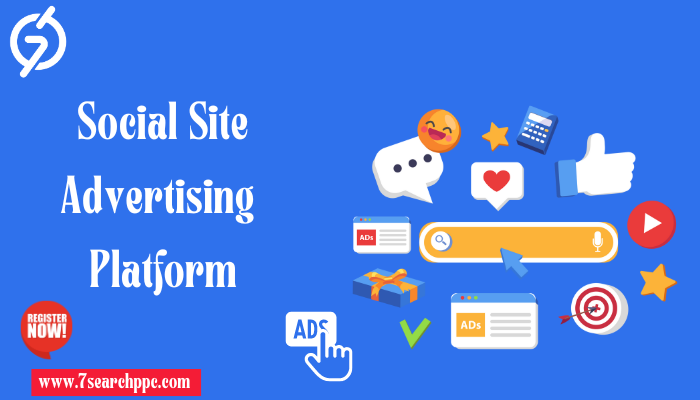As one of the most widely used social media platforms, Facebook Ads offers extensive reach and robust targeting capabilities. With over 2.9 billion monthly active users, Facebook allows businesses to create highly targeted social site advertising ads that can be tailored to specific age groups, interests, behaviors, and locations.
>>>Advertise Now<<<<
Key Features of Facebook Ads
- PPC and CPM Options: Facebook allows businesses to run PPC campaigns where you only pay when someone clicks on your ad, or CPM campaigns based on impressions.
- Ad Formats: Facebook supports various ad formats, including carousel ads, video ads, image ads, and native ads.
- Advanced Targeting: With Facebook’s data-driven audience segmentation, you can create custom and lookalike audiences to ensure your ads reach the most relevant users.
Instagram Ads
Owned by Facebook, Instagram is a visually-driven platform ideal for businesses looking to engage younger, creative audiences. Instagram Ads offer seamless integration with the user experience, making them appear native to the platform. Instagram ads can drive engagement, brand awareness, and conversions.
Key Features of Instagram Ads
- Visually Engaging Ad Formats: Instagram allows brands to showcase their products or services through photo ads, video ads, carousel ads, and stories ads.
- PPC and CPM Options: Like Facebook, Instagram offers both PPC and CPM models, allowing businesses to pay per click or per thousand impressions.
- In-App Shopping: Instagram’s shopping feature allows businesses to turn ads into direct sales funnels with shoppable posts.
LinkedIn Ads
For businesses focusing on B2B marketing, LinkedIn Ads is one of the best platforms to invest in. As the largest professional networking site, LinkedIn allows advertisers to target professionals, industries, and companies.
Key Features of LinkedIn Ads
- Professional Targeting: LinkedIn allows precise targeting by job title, industry, company size, and more, making it an excellent platform for B2B campaigns.
- Sponsored Content and InMail: Advertisers can use sponsored content to place native ads directly in the feed or send targeted ads via Sponsored InMail.
- PPC and CPM Pricing Models: LinkedIn offers both PPC and CPM options, allowing businesses to control their ad spend based on their campaign goals.
Twitter Ads
Twitter Ads offer businesses a fast-paced platform to engage users with real-time conversations. Twitter’s ad formats are versatile, ranging from promoted tweets to native ads that blend into the user’s timeline.
Key Features of Twitter Ads
- Promoted Tweets and Accounts: Businesses can promote individual tweets or entire accounts to gain followers and increase engagement.
- Real-Time Engagement: Twitter is particularly effective for time-sensitive promotions and real-time marketing campaigns.
- Targeting Options: Twitter Ads allow for targeting based on user interests, demographics, and behaviors, making it a good platform for both PPC and CPM campaigns.
Pinterest Ads
Pinterest Ads is an excellent platform for businesses in creative industries like fashion, home decor, and DIY projects. Pinterest users are often in the discovery phase, which means ads on this platform can drive traffic, leads, and sales.
Key Features of Pinterest Ads
- Rich Pins: These are native ads that blend seamlessly with regular content and provide more detailed information than standard pins.
- Targeting Options: Pinterest allows targeting based on keywords, interests, and demographics.
- PPC and CPM Models: Like other platforms, Pinterest offers flexible pricing models, enabling businesses to run PPC or CPM campaigns depending on their goals.
TikTok Ads
TikTok has quickly become one of the most popular social media platforms, especially among younger audiences. With its focus on short, engaging video content, TikTok Ads provides businesses with the opportunity to create viral campaigns.
Key Features of TikTok Ads
- Video-Centric Ad Formats: TikTok allows brands to create video ads, including in-feed ads, branded hashtag challenges, and top-view ads that appear as users open the app.
- Massive Engagement Potential: TikTok’s algorithm promotes content to wider audiences based on user engagement, making it possible for ads to go viral.
- Targeting and Measurement: TikTok offers robust targeting features and analytics to track ad performance, helping businesses make informed decisions on their PPC and CPM campaigns.
Snapchat Ads
Snapchat Ads focuses on delivering short, immersive, and engaging video ads to its primarily younger audience. Snapchat Ads are ideal for businesses looking to create engaging, playful content.
Key Features of Snapchat Ads
- Snap Ads and Story Ads: These short video ads appear between users’ snaps and stories, providing an immersive, full-screen experience.
- AR Lenses and Filters: Snapchat allows businesses to create interactive native ads like augmented reality lenses and filters to engage users.
- Targeting Options: Snapchat Ads can be targeted based on user demographics, interests, and behaviors, similar to other ad networks.
Benefits of Social Site Advertising
Targeted Audience Reach
One of the most significant benefits of social site advertising is the ability to target specific audience segments. Platforms like Facebook, LinkedIn, and Twitter offer detailed audience targeting options based on user data such as age, gender, interests, job titles, and behaviors. This precision ensures that your ads are reaching the right audience, improving your chances of conversions.
Cost-Effective Advertising
Social site advertising offers various pricing models, including PPC and CPM, which allow businesses to control their budgets. PPC ads ensure you only pay when someone clicks on your ad, while CPM charges you based on the number of impressions, making it an affordable option for both small and large businesses.
Measurable ROI and Analytics
Another advantage of social site advertising is the detailed insights you receive on your campaign’s performance. Most platforms provide in-depth analytics, enabling advertisers to track clicks, conversions, engagement, and overall ROI. This data allows businesses to optimize their campaigns in real-time for better results.
Choosing the Right Social Site Advertising Platform
Consider Your Audience
Not all platforms will be suitable for every business. If you’re targeting professionals, LinkedIn Ads might be the best choice. If your audience skews younger and enjoys creative content, TikTok and Instagram Ads are better options.
Set Clear Campaign Goals
Your advertising objectives will dictate the platform you choose. For example, if your goal is to drive quick sales, PPC campaigns on platforms like Facebook and Google might be more effective. For increasing brand awareness, CPM campaigns on Instagram or TikTok could work better.
Test and Optimize
Once you’ve selected a platform, it’s essential to test different ad formats (e.g., native ads, banner ads, social network ads to see what resonates with your audience. Use the platform’s analytics tools to monitor performance and optimize your campaigns as needed.
Conclusion
By leveraging the right platforms and ad formats like PPC, CPM, native ads, and banner ads, businesses can create effective social site advertising campaigns that drive engagement, build brand awareness, and increase sales. Whether you’re targeting a broad audience on Facebook or a niche professional group on LinkedIn, mastering social site advertising is essential for success in today’s digital landscape.
FAQs
What is the difference between PPC and CPM in social site advertising?
Ans.PPC (Pay-Per-Click) charges advertisers every time someone clicks on their ad, while CPM (Cost-Per-Thousand Impressions) charges based on the number of impressions (views) the ad receives.
What are native ads in social media advertising?
Ans.Native ads are ads that match the look, feel, and function of the platform they appear on, blending in with the organic content so that users perceive them as part of their regular social media experience.
What is the best platform for social site advertising?
Ans.The best platform depends on your target audience and campaign goals. Facebook and Instagram are ideal for visual and broad-reaching campaigns, while LinkedIn is better for B2B marketing.
How much does social site advertising cost?
Ans.Costs vary by platform, ad format, and bidding model. PPC campaigns generally start at a few cents per click, while CPM campaigns can range from a few dollars to higher amounts depending on the platform and audience targeting.




